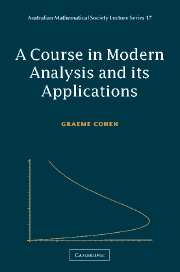1 - Prelude to Modern Analysis
Published online by Cambridge University Press: 06 July 2010
Summary
Introduction
The primary purpose of this chapter is to review a number of topics from analysis, and some from algebra, that will be called upon in the following chapters. These are topics of a classical nature, such as appear in books on advanced calculus and linear algebra. For our treatment of modern analysis, we can distinguish four fundamental notions which will be particularly stressed in this chapter. These are
(a) set theory, of an elementary nature;
(b) the concept of a function;
(c) convergence of sequences; and
(d) some theory of vector spaces.
On a number of occasions in this chapter, we will also take the time to discuss the relationship of modern analysis to classical analysis. We begin this now, assuming some knowledge of the points (a) to (d) just mentioned.
Modern analysis is not a new brand of mathematics that replaces the old brand. It is totally dependent on the time-honoured concepts of classical analysis, although in parts it can be given without reference to the specifics of classical analysis. For example, whereas classical analysis is largely concerned with functions of a real or complex variable, modern analysis is concerned with functions whose domains and ranges are far more general than just sets of real or complex numbers. In fact, these functions can have domains and ranges which are themselves sets of functions. A function of this more general type will be called an operator or mapping. Importantly, very often any set will do as the domain of a mapping, with no specific reference to the nature of its elements.
- Type
- Chapter
- Information
- A Course in Modern Analysis and its Applications , pp. 1 - 83Publisher: Cambridge University PressPrint publication year: 2003

